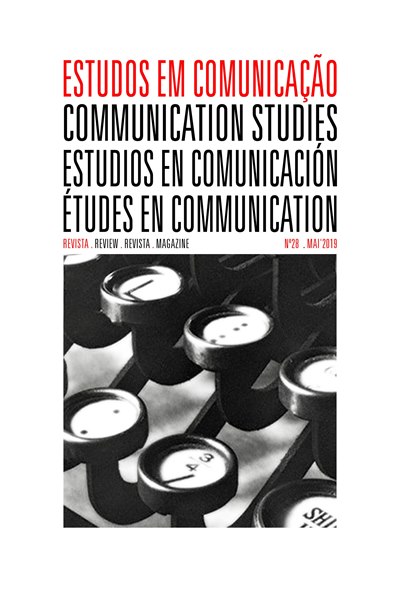Trust me, I am journalist! A Luhmannian approach on dis-information
Keywords:
journalism, fake news, information, disinformation, LuhmannAbstract
From the work of Niklas Luhmann’s on the Social System Theory, a theoretical approach on fake news and misinformation in mass media, is made in this work. This article develops on the Luhmann’s own question if the mass media constructs the reality. It discusses the central notion of the system, the communication, as well as the proliferation of disinformation. The analysis consists on the explain of some key concepts, like autopoiesis, self-reference, double contingency, complexity and selective process. It explains, also, some points that Luhmann explored being intrinsic configurations to the Social System for communication to be considered improbable.
References
Esteves, J. (2006). Apresentação. In N. Luhmann, A Improbabilidade da Comunicação (pp. 5-36).
Lisboa: Vega.
Boyd, D. (2017). Google and Facebook can’t just make Fake News Disappear. Wired. Link: www.wired.com/2017/03/google-and-facebook-cant-just-make-fake-news-disappear/.
Correia, J. (2004). Elementos para uma teoria da comunicação: Schutz e Luhmann e a construção social da realidade. BOCC, www.bocc.ubi.pt/pag/correia-joao-carlos-elementos-para-teoria- dacomunicacao.pdf: 1-13.
Correia, J. (2005). Entre o sistema e o mundo da vida: um lugar para a estranheza na análise sistémica do jornalismo. In J. Santos (ed.), O pensamento de Niklas Luhmann (pp. 321-346). Covilhã, Universidade da Beira Interior.
Deuze, M. (2012). Media Life: digital media and society. Cambridge, UK; Malden, MA: Polity Press.
Fallis, D. (2009). A Conceptual Analysis of Disinformation. Ideals. Comunicação apresentada na iConference 2009. http://hdl.handle.net/2142/15205.
Fletcher, N.; Kalogeropoulos, R.; Levy, D. & Nielsen, R. (2017). Reuters Institute Digital News Report 2017. https://reutersinstitute.politics.ox.ac.uk/sites/default/files/Digital%20News%2 0Report%202017%20web_0.pdf.
Gleick, J. (2012). Informação: uma história, uma teoria, um dilúvio. Lisboa, Ciclo de Leitores: Temas e Debates.
Herman, E. & Chomsky, N. (2008). Manufacturing Consent: the political economy of mass media. Londres: The Bodley Head.
Higgins, K. (2016). Post-truth: a guide for the perplexed. Nature News. www.nature.com/news/p ost-truth-a-guide-for-the-perplexed-1.21054.
Jack, C. (2017). Lexicon of Lies. Data & Society. https://datasociety.net/pubs/oh/DataAndSociet y_LexiconofLies.pdf
Luhmann, N. (1995). Social Systems. (trad. J. Bednarz, Jr., & D. Baecker). Stanford: Stanford University Press.
Luhmann, N. (2006). A Improbabilidade da Comunicação. (Seleção e Apresentação João Pis- sarra) 4º edição. Lisboa: Vega.
Luhmann, N. (2000). The Reality of Mass Media (trad. K. Cross). Califórnia: Stanford University Press.
Marcondes Filho, C. (2008). Comunicação e ação política no contínuo mediático: Luhmann contra Habermas. E nós contra todos. Galáxia: Revista transdisciplinar de comunicação, semiótica, cultura, 8(15): 39-58.
Sodré, M. (2006). O paradoxo da comunicação improvável. Observatório da Imprensa. http://obs ervatoriodaimprensa.com.br/jornal-de-debates/o-paradoxo-da-comunicacao-improvavel/.
Vosoughi, S.; Roy, D. & Aral, S. (2018). The spread of true and false news online. Science, 359(6380): 1146-1151. http://science.sciencemag.org/content/359/6380/1146/tab-pdf.
Wardle, C. (2017a). Fake News. It’s Complicated. First Draft. https://firstdraftnews.com/fake- newscomplicated/.
Wardle, C. & Derakhshan, H. (2017). Information Disorder: Toward an interdisciplinary fra- mework for research and policy making. Council of Europe F-67075 Strasbourg Cedex. https://rm.coe.int/information-disorder-report-november-2017/1680764666.
Wolf, M. (2009). Teorias da Comunicação. Lisboa: Presença.
Zuckerman, E. (2017). Stop Saying Fake News, It’s not Helping. In My Heart is in Accra. www. ethanzuckerman.com/blog/2017/01/30/stop-saying-fake-news-its-not-helping/.
Downloads
Published
Issue
Section
License
Estudos em Comunicação/Communication Studies is an Open Access journal. All its content is freely available without charge to the user or his institution. Users are allowed to read, download, copy, distribute, print, search, or link to the full texts of the articles in this journal without asking prior permission from the publisher or the author. Estudos em Comunicação, by Labcom, is licensed under a Creative Commons Atribuição-NãoComercial-SemDerivações 3.0 Unported License. By submitting your work to Estudos em Comunicação/Communication studies you confirm you are the author and own the copyright, that the content is original and previously unpublished, and that you agree to the licensing terms.


